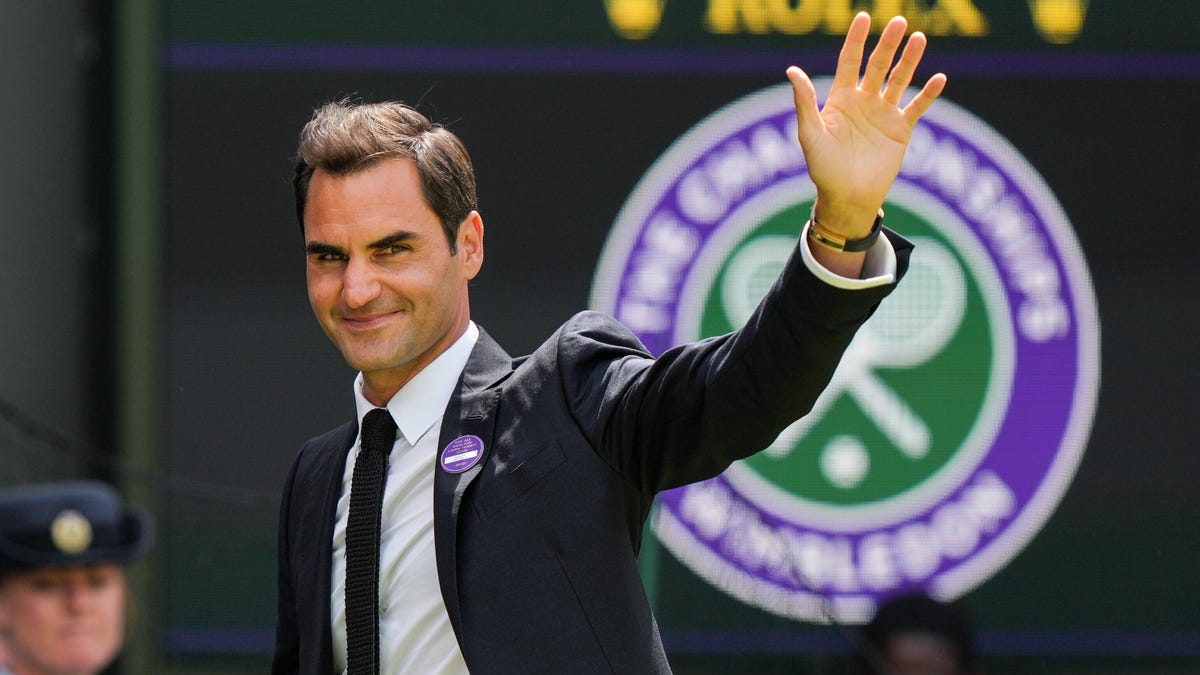The Favorite

I won’t be alone in saying that Roger Federer was the first winner I consistently cheered for. Part of that was growing up in Chicago, when as a child, being a fan of a consistent winner really wasn’t much of an option (as it is now. And everything turns, turns, turns…). But a sports fan’s natural inclination to any dominant force is to recoil from it. The Niners, the Yankees, the Wings (Chicago leanings again), and the Cowboys — they were boring simply because they won. It was impossible to appreciate all the parts that went into making them the historic champions they were when jealousy and boredom washed over them.
I didn’t even warm to the dynasty that did spring from home — the Bulls. They rose to greatness and history at a time when I was sinking into a teenage punk rock/rebellious phase I’ve yet to fully exit. The easiest way to swim against the current, as I was wont to do, was to revile the trendy, yuppie, uninformed crowd the Bulls drew then, all represented by Gene Siskel’s sweater courtside. Shawn Kemp was just more interesting to me, partly just so I could say it to those I deemed not as informed or as evolved as I was then (among the best two hours of my life were those where Kemp was traded to the Bulls for Scottie Pippen until Reinsdorf stepped in. Better for the Bulls, but goddammit, Reign Man!).
Tennis was no different. Pete Sampras was an all-time great, but didn’t rise above the monotony of watching the same guy win all the time. Again, part of that was personal animus, as Sampras pretty much wiped my first sports crush off the scene, Boris Becker (you may know him now as “Prisoner 57928-B”). Sampras won, and his accomplishments were jaw-dropping at the time, but I can’t remember anything about how he got there. The journey wasn’t all that remarkable.
That all changed when Federer came to the world’s notice in 2004. Tennis, much like boxing, is about styles. How a player plays is as important as what he wins and doesn’t. Sampras and Becker were easily identified as serve-and-volleyers. Agassi was the returner and grinder from the baseline. Lendl the dour version of Agassi. A raft of players who were simply a sonic boom of a serve and nothing else before Federer. Or the faceless Spaniards or South Americans who only mattered during the French Open. Well, I didn’t have three hours every day to watch them grind through four sets on clay, thank you very much (I totally did, but we lie to ourselves every day. And now I sincerely enjoy doing so every spring).
And then came Federer and he had…everything. He could do anything — and did. The frustration until that point for Federer himself was that he was trying to incorporate so much into his game, incorporate everything into his game in fact, that he found it nearly impossible to harness. There were too many variables that could go wrong on a given day. He was herding cats.
G/O Media may get a commission

22% Off + Promo Code
Eufy Security 4G LTE Cellular Security Camera
Watch the great ourdoors, wi-fi free
This Eufy cam is Wi-Fi free, and connects with 4G LTE and solar battery. The camera’s wide field of view and sharp 2K HD will have you peeping all sorts of flora and fauna in your great backyard, no matter the time of day.
Until he did. It just looked like a completely different game come Wimbledon 2004. As many have said before, it looked like he just had more time to pick a shot than everyone else. Through a combination of instincts, ballet-like movement, and his control of every point, it looked like he could pull up a BarcaLounger before every shot to figure out what of the many arrows in his quiver he was going to choose that time.
I had faded from tennis for a long while, though watched enough to enjoy it with my father during the Slams as it remained a favorite of his. And I was immediately drawn in upon seeing Federer. The way his forehand looked like he simply caught the ball on his racquet and then slung it wherever on the court he wished like it was a jai alai cesta instead of a racket. The one-handed backhands were whipped up the line or crosscourt with surgical efficiency. The serves always seemed to hit their spots. The volleys died of exhaustion while gagging over the net to find their permanent home on the court.
I cheered for Roger because I just always wanted to see more. It was evident from the start that you wanted to see as much of this as you could, because there would be nothing like it. He went 92-5 in 2006. I would have wanted 150-0 (which he came ridiculously close to, as the previous two years he went 74-6 and 81-4, meaning over three years he won 247 matches out of 262).
When someone rises to such a level of dominance in any sport — Messi, Jordan, Bonds, and in tennis, Nadal and Djokovic — the sensation is that they took the sport by force. When Messi slalomed through half a team with the ball or Jordan would drop 30 in a half, they were grabbing the game by the throat. They were bending it to their will, as no one had.
Federer…it felt like he called tennis to heel like the most obedient and loyal dog who had just gotten the tiniest bit rambunctious as the sight of guests. And it always did, faithfully returning to Federer’s feet, looking him in the eye in anticipation for what treat or affirmation would follow. Tennis was attuned to Roger.
I guess the biggest compliment I could pay to Federer, hugely insignificant in the sea that he’ll receive over the coming week before and after he plays one last time, is that he pushed me back onto the court for the first time since I was a child. Not to chase some dream or anything ridiculous, but maybe just to feel like I was in the same system as him, even if I’m on a moon out on the very outer rim. And maybe, with time and practice, I could just briefly feel what it was like to hit a ball so crisply or to play a point as it was meant to be played (though never a one-hand backhand, as I still don’t understand how one works and every time I’ve tried one felt like my shoulder would collapse in on itself). Just once. One serve out wide from the ad court, and taking the weak return back up the line with an inside-in forehand that I’ve watched Fed do a thousand times. Just for a second or two, to get the game to heel, even on the absolute lowest level. Maybe just to appreciate even more how Federer and tennis revolved around each other.
Federer’s status as the greatest ever won’t stick. Nadal’s and Djokovic’s accomplishments and record against him will do the job on that one. But again, it feels like as great as they are, Nadal and Djokovic took the game by force. Defiance in their game, a roar, which can be exhilarating. That there are times when they are fighting with tennis and its nature, and almost always winning that fight.
Federer never fought it, was always in symbiosis. It willingly gave itself to Federer and he to it, even if he changed what was understood and natural about it. And for that, while he may not go down as the best ever, he will go down as everyone’s favorite. As tennis’s favorite.
For all the latest Sports News Click Here

